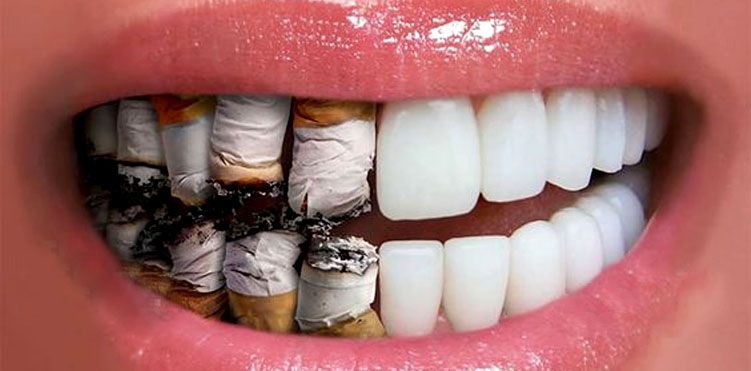 Diseases and deaths caused due to smoking are considered as the most easily avoidable ones by the CDC- Centers for Disease Control and Prevention (CDC). Here’re several points that elaborate the link between the consumption of tobacco products and bad oral health.
Diseases and deaths caused due to smoking are considered as the most easily avoidable ones by the CDC- Centers for Disease Control and Prevention (CDC). Here’re several points that elaborate the link between the consumption of tobacco products and bad oral health.
How does smoking affect oral health?
Dental cancer, leukoplakia, lung malignancy, and other types of oral cancer lead the list when it comes to ‘mouth’ problems from smoking. Tobacco consumption in forms like chewable, smokeless, cigarettes, pipes, etc. can increase the risk.
Oral Cancer
Tobacco smoke passes through the individual’s mouth, throat, and reaches the lungs. Repeated exposure to the chemicals present in the tobacco can harm all three. Tobacco smoke triggers the mutation of healthy cells in the patient’s mouth, resulting in oral cancer.
Cancer can spread rapidly due to the lymph nodes; blood vessels present in the neck and head.
A study conducted by scientists at the University of California has pointed out that 8 to 10 percent of oral cancer patients happen to be smokers. Thus, oral cancer can be avoided by controlling high-risk behaviors, including smoking.
Periodontal disease
Periodontal disease is caused due to the buildup of harmful bacteria around the gums and bone surrounding the teeth. The CDC’s study has pointed out that smokers are more vulnerable to gum diseases in comparison with nonsmokers as smoking negatively impacts the body’s immune system, making infection-fighting difficult. The inflammation caused as a result of periodontal disease can further weaken the supporting structures and bone around the affected denticle resulting in tooth loss. The habit also makes the healing of gums problematic during the treatment.
Reversing periodontal disease in the early stages remains easy, but the condition becomes worse quickly in the later stages.
Is there a link between smoking and stained teeth? How does smoking cause bad breath?
Besides causing oral cancer and making the smoker vulnerable to gum disease, smoking also delays the recovery if the patient undergoes a dental procedure or tooth extraction. It affects the person’s sense of smell as well as taste and triggers a lousy breath. Smoking also leaves behind stains on teeth which can be removed only with a professional cleaning technique performed at the dental office.
Can you get cavities from smoking?
Patients who have undergone restorative dentistry treatment are advised to avoid smoking as it leads to tooth decay, discoloration. It can create problems for crowns and fillings due to gum recession, resulting in uneven margins.
Research conducted by the CDC and NIH-National Institutes of Health has recently highlighted that people who consume tobacco products report a higher rate of cavities. Even those who use smokeless tobacco products like chewing tobacco or snuff are not safe and often develop gum line cavities as per the study.
Results stressed on the point that chewing tobacco proves more harmful than smoking for teeth as it makes the person four times more vulnerable to developing cavities at the tooth root. The longer the individual chews tobacco, the higher are the chances of developing cavities.
Smoker’s teeth vs. nonsmoker’s teeth
- As mentioned earlier, smoking negatively impacts the immune system, making it difficult for the body to fight various infections.
- Individuals who smoke a pack of cigarette per day or chew tobacco products end up with brown, yellow teeth. The effect keeps on becoming worse day by day. Tooth discoloration does not leave behind any pearly whites.
- Patients who smoke often end up with large cavities around the gums. Various infections spread quickly in the mouth. Gums are sensitive, dark red, and bleed very often. Their teeth are weak due to receding gums, and break down quickly. Such people end up spending money on restorative dentistry.
- While conducting an oral examination, dentists come across habitual smokers with bone and tissue damage around gums due to periodontal disease. Such cases need surgical intervention, including corrective surgery and bone grafts, to deal with bone damage.
- Last but not least, smokers end up with a more significant percentage of tooth loss caused due to weak gums.
Ways to get rid of black gums from smoking
Dental care experts come across patients with dark spots on gums, and of course, these individuals happen to be cigarette smokers. Besides dark gums, such patients have black spots on the floor of the mouth, top of the mouth, and internal cheek. The concerned medical condition is referred to as smoker’s melanosis.
Avoiding tobacco products is the only option along with regular brushing, flossing to recover the lost shine. The treatment for these black spots and gums involves cleanup of plaques, professional cleaning at the dental office after regular intervals of time.
If you are worried about the impact of smoking on your oral health and wish to get treatment for dark teeth, you can always make an appointment at Roswell (GA) based TruCare Dentistry.
